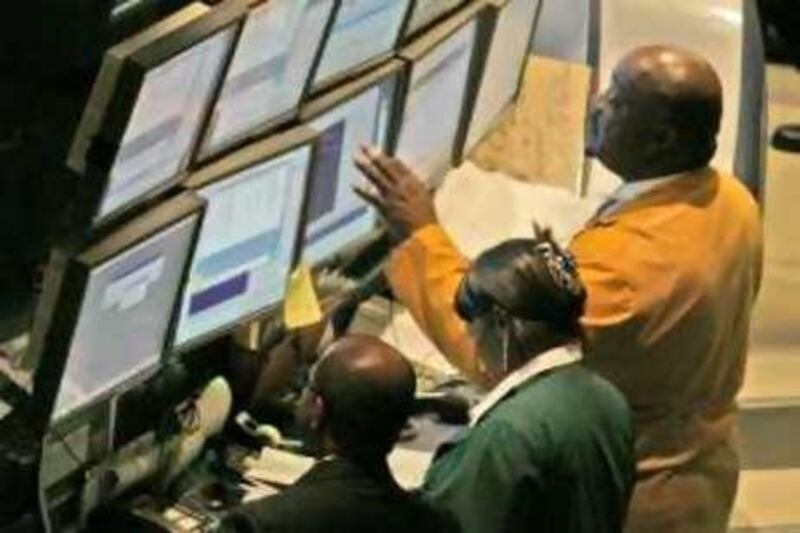Index giants Dow Jones and Standard & Poor's separately unveiled stock indices yesterday that track Gulf markets, a sign of growing interest across the globe in the region's equities markets. As developed markets in the West continue to be battered in the wake of the global credit crunch and the US subprime mortgage crisis, investors are increasingly looking east to place their investments. The GCC has emerged as an attractive destination for foreign dollars, as oil prices break new records and domestic companies grow into international powerhouses. Well-established indices represent a step toward maturity for these markets and could spur further foreign investment.
"It's great news for the region," said Jahangir Aka, senior executive officer at SEI, an asset management firm with operations in Dubai. "It provides international asset managers with benchmarks, and it provides visibility and a reference point." Dow Jones's new indices, called the Dow Jones GCC Index and the Dow Jones Islamic Market GCC Index, are the beginning of a broader push in the region. In addition to the indexes announced yesterday, Dow Jones also plans to introduce a GCC Titans 40 index in July or August to track the region's largest companies. There are also plans for indices for individual GCC countries and for sectors such as financials and industrials.
"This is an [index] family strategy, but it is a staged family strategy," Rushdi Siddiqui, global director for Islamic indices at Dow Jones, said. "We will gradually build up a GCC product line that has all of the countries and sectors." The two indices launched yesterday are similar, except that the Islamic index only includes stocks that pass a Sharia-compliance screen. Both have stocks from bourses in the UAE, Kuwait, Bahrain, Qatar and Oman. Saudi Arabia is excluded because its markets are open only to GCC nationals; the Dow Jones indexes target global investors.
Meanwhile, Standard & Poor's, which already has a variety of GCC-centric indices that it began in the late 1990s, announced its S&P GCC 40 index. It will track 40 large companies in all GCC countries excluding Saudi Arabia. It is to be licensed as an index for asset managers and for providers of exchange traded funds (ETFs), or funds based on an index that trade on an exchange like a stock. "The new index has been designed in response to investor demand for access to the largest and most liquid stocks in the region's equity markets," Alka Banerjee, vice president of Standard & Poor's Index Services, said in a statement yesterday. "It is different to existing GCC indices, which are more focused on providing benchmark performance data. With a pool of large and easily accessible underlying stocks, the S&P GCC 40 Index will provide a unique way for international investors to take part in the Gulf's growth story."
Indexing firms such as Dow Jones, S&P, MSCI Barra and FTSE derive most of their revenues through licensing agreements with asset managers who use index figures as a benchmark to measure their performance and market their services. Big names such as Dow Jones and S&P also bring cachet that could further stoke interest in the country's burgeoning markets. In another move that could affect the UAE's capital markets, Dow Jones also announced yesterday that it would include the UAE, Oman and Qatar in its Dow Jones Wilshire Global Index family, used primarily by US investors, starting on Oct 1. Bahrain and Kuwait were added to those indexes in March.
This comes on the heels of indications by MSCI, which runs the world's leading emerging markets index, that the UAE and other Gulf countries may be added to its main developing world index as early as next year. "All this ties in with the sense that the UAE is gaining wider acceptance with the benchmark index providers," said John Lomax, an analyst at HSBC. The UAE's stake in the Dow Jones GCC Index includes 30 companies making up about 22 per cent of the index's market capitalisation. These include Dubai Ports World, Emaar Properties, Du and other large firms open to foreign investment. Kuwaiti companies were the most heavily weighted in the index, taking up a 52 per cent share.
In the S&P GCC 40 Index, the UAE takes the lion's share, with 12 companies representing 35 per cent of the index's weighting. Kuwait comes second, with 12 companies and 30 per cent of the index. Dow Jones had announced that it would introduce new indexes weeks before their launch, but S&P did not give any indication that a new GCC index was forthcoming until the announcement yesterday. "Honestly, we had no idea" they would happen on the same day, said Sumeet Nihalani, senior director of sales for the Asia Pacific and Middle East region at Dow Jones.
@Email:afitch@thenational.ae






